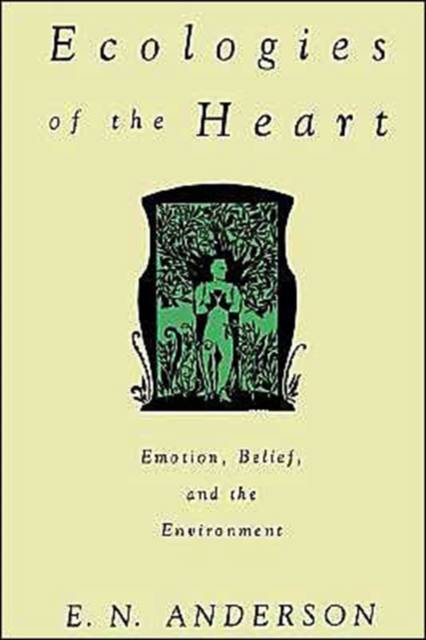
- Retrait gratuit dans votre magasin Club
- 7.000.000 titres dans notre catalogue
- Payer en toute sécurité
- Toujours un magasin près de chez vous
- Retrait gratuit dans votre magasin Club
- 7.000.000 titres dans notre catalogue
- Payer en toute sécurité
- Toujours un magasin près de chez vous
Ecologies of the Heart
Emotion, Belief, and the Environment
E N Andersen, Eugene N Anderson
Livre relié | Anglais
55,45 €
+ 110 points
Description
There is much we can learn about conservation from native peoples, says Gene Anderson. While the advanced nations of the West have failed to control overfishing, deforestation, soil erosion, pollution, and a host of other environmental problems, many traditional peoples manage their natural resources quite successfully. And if some traditional peoples mismanage the environment--the irrational value some place on rhino horn, for instance, has left this species endangered--the fact remains that most have found ways to introduce sound ecological management into their daily lives. Why have they succeeded while we have failed? In Ecologies of the Heart, Gene Anderson reveals how religion and other folk beliefs help pre-industrial peoples control and protect their resources. Equally important, he offers much insight into why our own environmental policies have failed and what we can do to better manage our resources.
A cultural ecologist, Gene Anderson has spent his life exploring the ways in which different groups of people manage the environment, and he has lived for years in fishing communities in Hong Kong, Malaysia, Singapore, Tahiti, and British Columbia--as well as in a Mayan farmtown in south Mexico--where he has studied fisheries, farming, and forest management. He has concluded that all traditional societies that have managed resources well over time have done so in part through religion--by the use of emotionally powerful cultural symbols that reinforce particular resource management strategies. Moreover, he argues that these religious beliefs, while seeming unscientific, if not irrational, at first glance, are actually based on long observation of nature. To illustrate this insight, he includes many fascinating portraits of native life. He offers, for instance, an intriguing discussion of the Chinese belief system known as Feng-Shui (wind and water) and tells of meeting villagers in remote areas of Hong Kong's New Territories who assert that dragons live in the mountains, and that to disturb them by cutting too sharply into the rock surface would cause floods and landslides (which in fact it does). He describes the Tlingit Indians of the Pacific Northwest, who, before they strip bark from the great cedar trees, make elaborate apologies to spirits they believe live inside the trees, assuring the spirits that they take only what is necessary. And we read of the Maya of southern Mexico, who speak of the lords of the Forest and the Animals, who punish those who take more from the land or the rivers than they need. These beliefs work in part because they are based on long observation of nature, but also, and equally important, because they are incorporated into a larger cosmology, so that people have a strong emotional investment in them. And conversely, Anderson argues that our environmental programs often fail because we have not found a way to engage our emotions in conservation practices.
Folk beliefs are often dismissed as irrational superstitions. Yet as Anderson shows, these beliefs do more to protect the environment than modern science does in the West. Full of insights, Ecologies of the Heart mixes anthropology with ecology and psychology, traditional myth and folklore with informed discussions of conservation efforts in industrial society, to reveal a strikingly new approach to our current environmental crises.
A cultural ecologist, Gene Anderson has spent his life exploring the ways in which different groups of people manage the environment, and he has lived for years in fishing communities in Hong Kong, Malaysia, Singapore, Tahiti, and British Columbia--as well as in a Mayan farmtown in south Mexico--where he has studied fisheries, farming, and forest management. He has concluded that all traditional societies that have managed resources well over time have done so in part through religion--by the use of emotionally powerful cultural symbols that reinforce particular resource management strategies. Moreover, he argues that these religious beliefs, while seeming unscientific, if not irrational, at first glance, are actually based on long observation of nature. To illustrate this insight, he includes many fascinating portraits of native life. He offers, for instance, an intriguing discussion of the Chinese belief system known as Feng-Shui (wind and water) and tells of meeting villagers in remote areas of Hong Kong's New Territories who assert that dragons live in the mountains, and that to disturb them by cutting too sharply into the rock surface would cause floods and landslides (which in fact it does). He describes the Tlingit Indians of the Pacific Northwest, who, before they strip bark from the great cedar trees, make elaborate apologies to spirits they believe live inside the trees, assuring the spirits that they take only what is necessary. And we read of the Maya of southern Mexico, who speak of the lords of the Forest and the Animals, who punish those who take more from the land or the rivers than they need. These beliefs work in part because they are based on long observation of nature, but also, and equally important, because they are incorporated into a larger cosmology, so that people have a strong emotional investment in them. And conversely, Anderson argues that our environmental programs often fail because we have not found a way to engage our emotions in conservation practices.
Folk beliefs are often dismissed as irrational superstitions. Yet as Anderson shows, these beliefs do more to protect the environment than modern science does in the West. Full of insights, Ecologies of the Heart mixes anthropology with ecology and psychology, traditional myth and folklore with informed discussions of conservation efforts in industrial society, to reveal a strikingly new approach to our current environmental crises.
Spécifications
Parties prenantes
- Auteur(s) :
- Editeur:
Contenu
- Nombre de pages :
- 272
- Langue:
- Anglais
Caractéristiques
- EAN:
- 9780195090109
- Date de parution :
- 28-03-96
- Format:
- Livre relié
- Format numérique:
- Genaaid
- Dimensions :
- 165 mm x 243 mm
- Poids :
- 526 g







